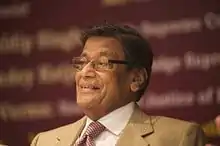K. K. Venugopal
Kottayan Katankot Venugopal (born 6 September 1931) is an Indian constitutional lawyer and a senior advocate in the Supreme Court of India.[1] He was enrolled as an advocate on January 27, 1954. On 1 July 2017, he was appointed as the Attorney General of India and retired on 30 September, 2022.[2][3] He is Patron of SAARCLAW (A regional apex body of SAARC) and earlier has been its President.[4] He is founder of M K Nambyar SAARCLAW Centre For Advanced Legal Studies at the NALSAR Law University.[5]
K. K. Venugopal | |
|---|---|
 | |
| 13th Attorney General of India | |
| In office 1 July 2017 – 30 September 2022 | |
| Prime Minister | Narendra Modi |
| Preceded by | Mukul Rohatgi |
| Succeeded by | R. Venkataramani |
| Personal details | |
| Born | Kottayan Katankot Venugopal 6 September 1931 Kanhangad, South Canara, Madras Presidency, British India (present day Kasaragod, Kerala, India) |
| Alma mater | |
| Occupation | Lawyer |
| Awards |
|
Early and personal life
Venugopal was born in a Nair family to Meloth Krishnan Nambiar and Kalyani Nambiar in Kanhangad, a town in the South Canara district of Madras Presidency of British India (present-day Kerala, India), and grew up in Mangalore.
Venugopal did his law from Raja Lakhamgouda Law College, Belgaum. He had also studied at the St. Aloysius College, Mangaluru.[6]
Career
In 1970, K.K. Venugopal appeared in Supreme Court of India on Behalf of a aspiring Medical Student for his MBBS admission in the state of Tamil Nadu. The Junior lawyer was the former finance minister Mr.P.Chidambaram. He appeared on behalf of Dr. A. Periakaruppan s/o Dr. PR. Annamalai MD and the Chief Justice Hegde gave the verdict on Jan 15th 1971 in favor of the aspiring Medical Student Periakaruppan and the State of Tamil Nadu lost its Case. This is a land mark decision then, that gave more weightage for the merit rather than other influences.
Venugopal served as the President of the Supreme Court Bar Association (1990-91, 1994-95 adn 1999-2000). He served as President of the Union Internationale des Avocats (UIA - International Association of Lawyers) from 1996 to 1997.
Venugopal has appeared in many high-profile cases. Most significantly, he was appointed by the Royal Government of Bhutan to serve as the Constitutional adviser for drafting of the Constitution of Bhutan.[7][8] He has advised the then President of Sri Lanka, Mrs. Chandrika Bandaranaike Kumaratunga, on the devolution of powers on the Tamil regions of Sri Lanka (2004). On 30 June 2017, he was appointed as the Attorney General of India under the leadership of Prime Minister Narendra Modi. The 86-year-old succeeded Mukul Rohatgi, who stepped down after the first term. Venugopal held the office of Additional Solicitor General in Morarji Desai’s Government. He has appeared in a variety of cases in the last 50 years. Venugopal was appointed as amicuscuriae to assist the Supreme Court in the high profile 2G spectrum case.
He also appeared for the BJP leader L. K. Advani in the Demolition of the Babri Masjid case.[9]
Honours
In 2015, he was conferred Padma Vibhushan award by the Government of India. This is the second-highest civilian honour in India. In 2002, he was awarded Padma Bhushan, the third-highest civilian honour. He was awarded the Vidhi Ratna in 2023 by the Bar Council of India for his outstanding contribution to the Legal Profession. He received the "Lifetime Achievement Award" from the US-India Business Council in 2012.[10]
He was conferred the Honoris Causa Degree of Doctor of Laws by (1) the Utkal University, Orissa, in 2010; (2) by the Chanakya National Law University, Patna, in 2018; and (3) by the NALSAR University of Law, Hyderabad, in 2019.
Opinion on judicial reforms
Venugopal is one of the main advocates for judicial reforms in India. He is against the creation of regional benches of the Supreme Court of India. Instead, he recommends that Courts of Appeal be established in the four regions of the country, who finally decide on appeals from the High Court judgments in all cases other than cases of national importance which affect the whole country, disputes between States or between States and the Centre, Presidential references and substantial questions of law relating to interpretation of the Constitution. This will relieve the burden on the Supreme Court.[11]
References
- Constitutional experts criticise CEC’s decision
- "I will be 90 by the time this one year will be over: KK Venugopal; Law Minister Ravi Shankar Prasad speaks on Attorney General's extension".
- "Senior advocate R. Venkataramani is the new Attorney General of India". The Hindu. 28 September 2022.
- "K.K. Venugopal". January 2019.
- "M K Nambyar SAARCLAW Centre for Advanced Legal Studies | NALSAR UNIVERSITY OF LAW".
- "Meet K K Venugopal India's 15th Attorney General; all you want to know about government's chief legal advisor". Financialexpress.
- "Meet 86-yr-old KK Venugopal, who replaces Mukul Rohatgi as Attorney General". Business Standard India. 30 June 2017.
- "Aadhaar, triple talaq immediate challenges for new attorney general KK Venugopal". 3 July 2017.
- "Babri Masjid Case: Supreme Court adjourns Babri demolition case hearing for two weeks". The Economic Times. Retrieved 12 May 2022.
- "Padma Awards" (PDF). Ministry of Home Affairs, Government of India. 2015. Archived from the original (PDF) on 15 October 2015. Retrieved 21 July 2015.
- "Conversation with Constitutional Law Expert and Senior Advocate KK Venugopal". Bar & Bench. 17 August 2012. Archived from the original on 6 September 2012. Retrieved 6 September 2012.